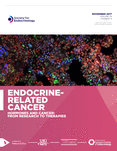Autophagy in endocrine tumors
- Andrea Weckman1,
- Fabio Rotondo2⇑,
- Antonio Di Ieva1,
- Luis V Syro3,
- Henriett Butz2,
- Michael D Cusimano1 and
- Kalman Kovacs2
- 1Division of Neurosurgery, Department of Surgery
2Division of Pathology, Department of Laboratory Medicine, St Michael's Hospital, 30 Bond Street, Toronto, Ontario, M5B 1W8 Canada
3Department of Neurosurgery, Hospital Pablo Tobon Uribe and Clínica Medellin, Medellin, Colombia
- Correspondence should be addressed to F Rotondo; Email: rotondf{at}smh.ca
Abstract
Autophagy is an important intracellular process involving the degradation of cytoplasmic components. It is involved in both physiological and pathological conditions, including cancer. The role of autophagy in cancer is described as a ‘double-edged sword,’ a term that reflects its known participation in tumor suppression, tumor survival and tumor cell proliferation. Available research regarding autophagy in endocrine cancer supports this concept. Autophagy shows promise as a novel therapeutic target in different types of endocrine cancer, inhibiting or increasing treatment efficacy in a context- and cell-type-dependent manner. At present, however, there is very little research concerning autophagy in endocrine tumors. No research was reported connecting autophagy to some of the tumors of the endocrine glands such as the pancreas and ovary. This review aims to elucidate the roles of autophagy in different types of endocrine cancer and highlight the need for increased research in the field.
- Revision received 20 April 2015
- Accepted 6 May 2015
- Made available online as an Accepted Preprint 6 May 2015
- © 2015 Society for Endocrinology












